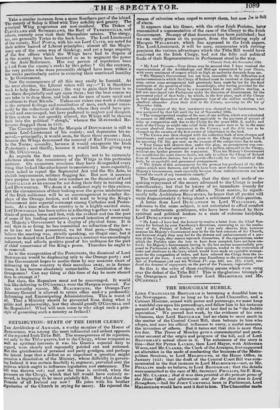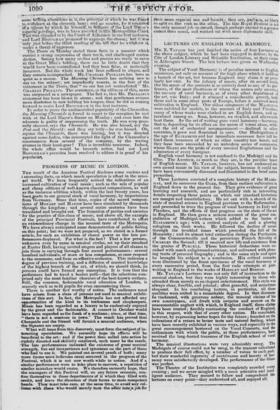THE BROUGHAM BUBBLE.
LORD CHANCELLOR BROUGHAM is becoming a dreadful bore to the Newspapers. But as long as he is Lord Chancellor, and a Cabinet Minister, armed with power and patronage, we must keep a watchful eye upon his proceedings, and follow him in his tortuous pursuit of what he, we suspect, will at last find to be "the bubble reputation." We proved last week, by the evidence of his own ivitnesses, that Lord %wools im had no claim to more merit in the matter of the Central Court UM, than belongs to him who adopts, and uses his official influence to carry, a useful measure, the invention of others. But it turns out that this is more than his due. The Times of Monday gave a circumstantial and parti- cular account of the origin and progress of the bill, and of Lord BROUGHAM'S actual share in it. The substance of the 'story is this—that Sir PETER LAURIE, then Lord Mayor, with Alderman Wools, and Mr. CLARKE, the Clerk of the Arraigns, first suggested an alteration in the mode of conducting the business of the Metro- politan Sessions, to Lord MELBOURNE, at the Home Office, in January 1833; that the draft of the Central Court Bill was com- municated in the first instance to Lord MELBOURNE—not, as Mr. PHILLIPS made us believe, to Lord BROUGHAM; that the details werecommitted to the care of Mr. Secretary PHILLIPS, Sir F. ROE, and Mr. CLARKE ; that it was then printed at the private press of the Home Ojiee, and afterwards sent for the first time to Lord Brougham,—had Sir JOHN CAMPBELL been in Parliament, Lord MELBOURNE would have sent it first to him. The Chancellor made some trilling alteeations in it, the princitsal of which he was force! to,withdrave at the eleventh hour ; and 14o wonder, for it consiete Of a' tpuse by which be himself, in defiance of the Lord' 7ilnyor's especial privilege, was to have presided inthis Metropolitan Court. This was objected toy the Court of Aldermen in the first instance, and Lord 'hot:tineu promised to expunge the clause; but it was only just before the third reading of the hill that he with,drew it, under a threat of exposure. The Times on Monday stated these facts .in a manner which carried a strong impression of their truth, arel challenged contra- diction. Seeing bow many set ibes and presses are ready to move at the Great Man's bidding, there can be little doubt that they would have been contradicted had they been false, or materially incorrect, But the whole week has been suffered to elapse, and they remainviiimpeached. Mr. CHARLES PHILLIPS has been as quiet as a mouse. The Morning Chronicle has nothing new to say on the subject; yet impudently asserts, in the face of the statement in the Times, that" no one has yet contradicted" Mr. CHARLES PHILLIPS. The assurance, or the silliness of this, never was surpassed in a newspaper. The fact is, that Mr. PHILLIPS'S statement has been blown to atoms; and that gentleman evinces more disetetion in now holding his tongue, than he did in coming forward to assist Lord BROUGHAM in the first instance.
In order to prove the undiminished popularity of the Chancellor, the Mornino. Chronicle is forced to resort to the reception he met with at the Lord Mayor's dinner on Monday ; and even here the advocate is guilty of suppressing the truth. He was very gene- rally cheered, says the Chronicle. He was also hissed, say the Post and the Herald: and they say truly—he was hissed. Oh, rejoins the Chronicle, there was hissing, but it was directed against some ladies, who intercepted the light of the Chancellor's -countenance. from several of the company, by the wavily, plumes in their head-gear! This is incredible nonsense. Indeed', the whole affair would be beneath notice, had not Lord BHOUGHA.M'S parasites been resolved to adduce it in proof of his popularity,





















 Previous page
Previous page